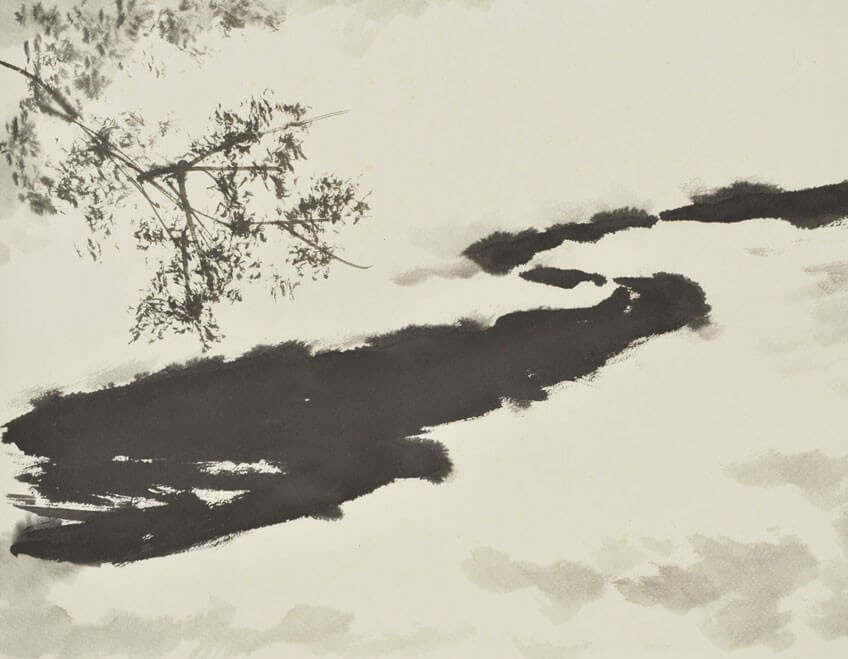
by Tal Clapp
My parents like to tell a story. When I was a few months old they left me in the care of my grandparents (I don’t remember which) and went camping in the Uwharrie Mountains. It was early Winter, and cold. They stayed at a state park campground. I’ve heard the story often enough, and been in those Winter woods enough, to picture it each time they begin: bare trees, sere leaves rustling in the woods and scattered in the frost-hardened path. The sky clouded as it can only be in winter, one continuous gauze of grey over a half-seen bruise of sky. They got a late start. There must have been a fire already flinging shadows on the dry grass by the time it gave any warmth.
The trip was poorly planned. As it was Winter the park’s gates were closed early, and there was no way in or out after dark. I was young enough to still be nursing, but not there to nurse. The night was much colder than expected, and as time passed since I’d last been fed the milk begin to build in my mother’s breast. In the cold, she couldn’t express the milk, so her breasts grew hard and swollen. With no way out of the park, and no method of relief, there was nothing for it but a long, sleepless night in a cold tent, full I’m sure of recriminations, until the gates opened in the morning, then a long, bleary drive home at first light with the horizon coloring like an egg dipped in pale dye, until finally, as I recently wrote in part of an ill-conceived and unfinished long poem about my childhood:
showering, the milk streamed from her breasts unbidden
coloring the water in the drain a ghostly white
as if to nurse some other son
about whom it was better nothing should be said
The story is always told as a humorous anecdote. While it is from the early years of my parents’ marriage when things were presumably good and in their strength of facing together the world as a new family they must have been able to laugh off (after awhile..) this sort of incident, or even taking it as a result of Mel Brooks’ equation of comedy equals tragedy plus time, the misery of it (my mother’s physical pain, my father’s hangdog shame – the trip was his idea) becomes more apparent to me each time I hear it.
Yet, though my parents are long divorced, and differ in the details and the way of the telling – and perhaps before airing family laundry I should give them the chance to consult at least over pairing the socks, as it were – there never seems to be any rancor in the telling. Could it be for them a fond memory? But I suppose I’ve seen in my own life that for a couple in love trials can become badges of honor in retrospect, and sources of dark humor. What passes between two people will always seem strange to anyone outside, the bizarre customs of an exotic tribe of two, how much more so when the tribe is long lost and only known through tales doubtfully preserved.
I’ve heard this story countless times, I will say the first time while hiking in those same mountains with my father because there is no one to contradict me and it is at least true I heard it once there. When I heard it most recently, my mother told it, but it was my sister left behind with my grandparents, still of nursing age. I was not even born! She must always have been, and I simply replaced her with myself – after nursing one child, my parents would have known better than to be found in that dilemma with a second. But my first reaction was to feel, as I wrote in that same misbegotten poem:
… a vague dismay
that my mother should misremember
a story in which I was so early,
if absent, a protagonist, that even
when it comes to things we bring
into the world we are still the center
of it to ourselves
But I made no attempt to correct or confirm, better to retain my version of things, then to have them proven wrong, which only makes of myself a case in point for that theory about us all being the center of the world to ourselves.
My parents (or my sister, who for so many years I’ve edited out to make room for myself, she may want the story back) may read this, and tell me for years I’ve been hearing what I wanted to hear. But to quote myself again:
the testimony of others
will only be patched into my own,
and inasmuch as we believe
we inhabit the same world
it is only because we negotiate
approximate but separate truths
So between them my parents seem to have turned a miserable night into a funny story, and I have helped myself to a part in it, and tried to turn it into a tragedy. And it may be that I have to give my part back, at least, though I would rather remain the infant left behind than become the one yet to exist.

